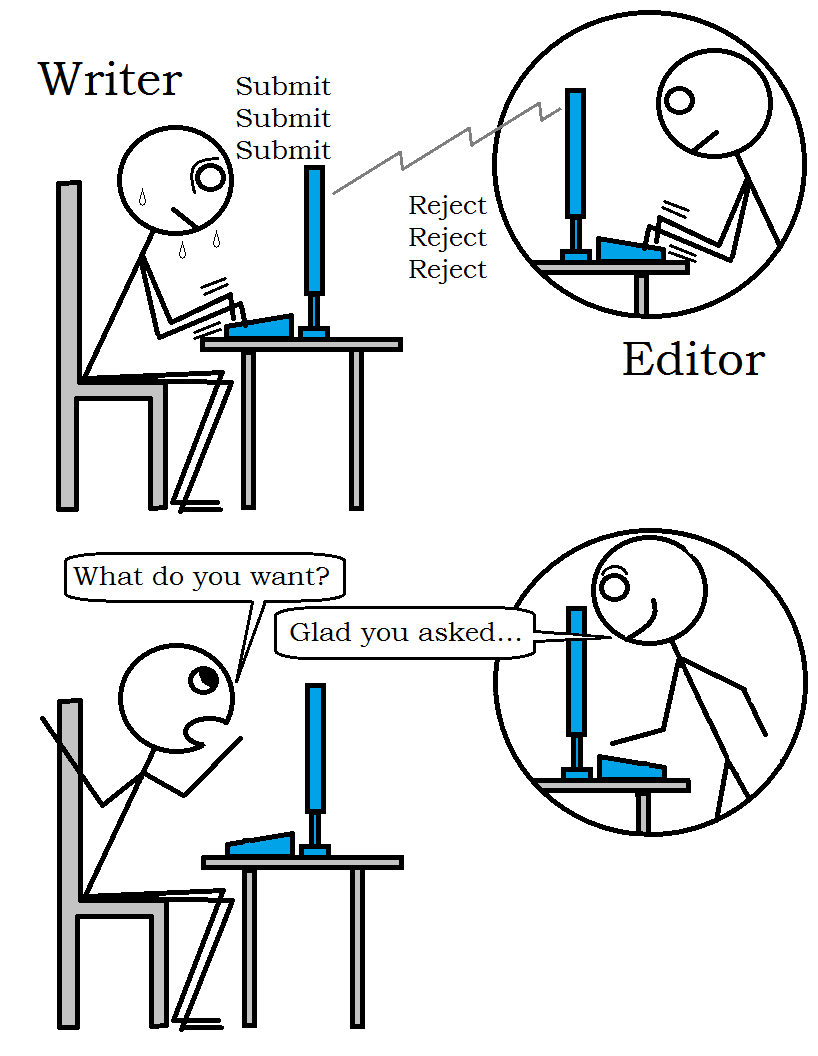Most beginning writers, especially those who’ve suffered a few rejections, wonder about the answer to this post’s subject question. What do editors want?
I can’t pretend to speak for all editors. I’ve not reached the point where all my stories get accepted. I’ve never worked as an editor myself.
However, a few years ago, one editor* gave me his answer to that question, and it’s a good one. He wrote, “I’m a stickler for a story having not only a clear protagonist, antagonist, and plot, but a resolution of the plot (in which the protagonist participates) and a change in the protagonist on some level. I like stories that, as Twain once said, ‘accomplish something and arrive somewhere.’ Most accomplish nothing and arrive nowhere. It’s dreadful to read through an otherwise good story and have it end without ending.”
Let’s accept that as a working proposition and break it down.
- Clear protagonist. The reader shouldn’t have to wonder who the main character is. I believe the editor chose the word ‘protagonist’ rather than ‘hero’ since the main character need not be particularly heroic.
- Clear antagonist. Stories must have conflict. There must be some entity against whom the protagonist struggles. The antagonist need not be a person; it could be nature or the environment. Once again, once finished with the story, any reader should be able to name the antagonist.
- Clear plot. By this, I believe the editor was saying the story must portray events in a logical order. The events must relate to the conflict and follow each other with a clear cause-and-effect relationship. Some events will escalate tension and others will relieve it. Overall, there needs to be a gradual buildup of tension until the resolution.
- Plot resolution in which the protagonist participates. The resolution is that part of the plot where the conflict is resolved (the bad guy is defeated, the two people fall in love, the protagonist overcomes a character flaw, etc.). It’s important that the protagonist take action to bring about this resolution and not be some bystanding witness to the action. Note: the word ‘resolved’ does not imply happily or favorably. Resolution of the conflict could be accomplished by the protagonist’s death or other defeat.
- Protagonist changes on some level. If your protagonist is the same person at the end of the story as she was at the beginning, the reader will wonder what the point of the story was. The clause ‘on some level’ refers to the fact that conflicts are generally classed as external (bad-guy antagonist or unforgiving environment) or internal (character flaw, irrational fear, grief, unreasonable guilt, psychological problem, etc.). Many stories impose both internal and external conflicts on the protagonist. For internal conflicts, the change should be an overcoming of the condition, or at least hope of such problem solving. For external conflicts, the protagonist’s change is generally a maturation of some kind.
- Story accomplishes something. This is part of the Twain quote, and is a restating of points 4 and 5. The plot and conflicts must resolve and the protagonist must change. A great way for a story to accomplish something is if it says something useful about the human condition.
- Story arrives somewhere. By this, I take Twain to mean that the story must end at an appropriate point, not before the conflict resolution, and not too long afterward.
Save your editor some time, and save yourself another bout of rejection-grief. Check if your story meets all of the above criteria before submitting it. If it doesn’t, it’s not ready.
Of course, even if your story does meet these criteria, that’s no guarantee of acceptance. Who can pretend to know what all editors want? Certainly not—
Poseidon’s Scribe
* Note: the editor who wrote that is David M. Fitzpatrick, of Epic Saga Publishing. He accepted one of my stories for an upcoming Epic Saga anthology. David has gone into more detail about what he looks for in submissions; see this wonderful blog post here, which includes some great writing exercises, too.
